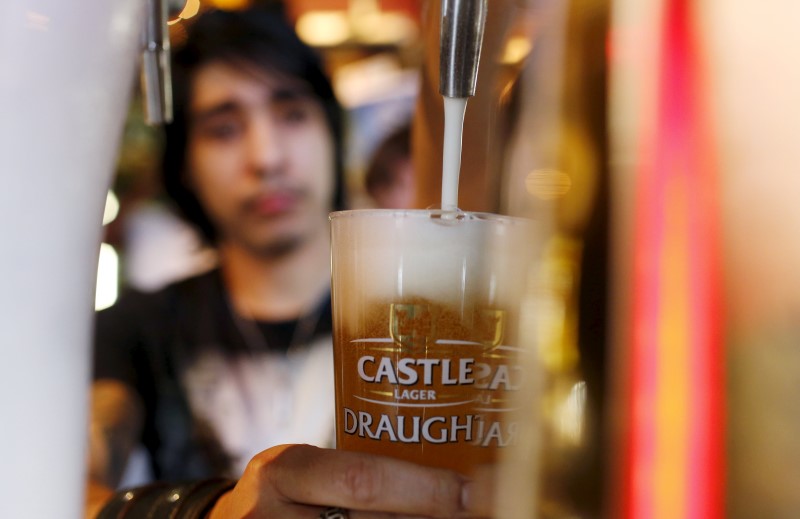By Philip Blenkinsop and Martinne Geller
BRUSSELS/LONDON (Reuters) - A tie-up of brewing giants Anheuser-Busch InBev (BR:ABI) and SABMiller (L:SAB) would reset the global brewing industry, allowing a fierce competitor to extend its lead and ringing last call for smaller rivals to snap up meaningful assets.
World leader AB InBev said on Wednesday it had approached SABMiller's board regarding a friendly combination that would marry its Budweiser, Stella Artois and Corona beers with SABMiller brands like Peroni, Grolsch and Pilsner Urquell.
A deal, likely worth over $100 billion, would be complicated and among the biggest in corporate history as well as the crowning achievement of the Brazilian financiers behind private equity firm 3G Capital, known for ruthless cost-cutting and high profit margins enabling them to play extra hard against rivals.
"If this deal goes ahead, there will really be one global beer company. The sector will be pretty much done," said Ian Liddle, chief investment officer of Allan Gray, a top 10 SAB investor. "This is the deal of deals and it is one of the reasons why ABI can justify paying a high premium."
No offer has been made, but analysts estimate a price of 40 to 45 pounds per SAB share, which would be a 35 to 52 percent premium to the stock at the start of the week.
Liddle welcomes the opportunity to assess any offer, and said that for any consideration paid in ABI shares, he would like to see a listing in Johannesburg, where SABMiller started out in 1895 selling beer to gold miners.
But given the footprints of both companies, divestitures are likely, presenting opportunities for the likes of Heineken (AS:HEIN), Carlsberg (CO:CARLb) and Molson Coors (N:TAP).
The company would almost certainly have to sell SABMiller's majority stake in U.S. joint venture MillerCoors. Partner Molson Coors is the obvious buyer, so would likely get an attractive price. With a price tag of around $10 billion, it would be a big deal for Molson, whose market value is $15 billion after its shares surged following news of the approach. Having it in flux could be an opportunity for others.
"It's very strategic for anybody. If Heineken want to be a leader in the world, this might be their one and only chance to step change their business in the U.S.," said an industry banker.
In China, the combined brewer could also end up selling SABMiller's 49 percent stake in CR Snow. Partner China Resources Enterprise (HK:0291) may wish to take full control or may be open to another entrant.
Further assets, such as in eastern Europe, may also come up for grabs.
HARD LIFE
Exactly one year ago, Dutch brewer Heineken rejected a takeover approach by SABMiller, whose move was seen as a defense against advances from AB InBev.
Family-controlled Heineken at the time said it wanted to remain independent, but with a combined rival some three times its size, analysts say the solo route is about to get tougher.
"I don't think it's a good idea. They'll go head-to-head in Europe and Africa," said Morningstar analyst Phil Gorham. "Life is going to be difficult for the likes of Heineken and Carlsberg."
Carlsberg, which is in a state of management flux while it battles weak sales in Russia and Ukraine, would have limited overlap with the new megabrewer, but Heineken and Diageo (L:DGE), maker of Guinness, could feel the heat in Africa, where a rising middle class is increasingly drinking beer.
A combined megabrewer would soak up as much as half of the world's beer profits and with fatter margins than rivals, it could be more aggressive on price or marketing spend than rivals, such as in Nigeria where SABMiller's market share is around 10 percent.
AB InBev's operating margin last year was 32.5 percent versus a range of 14 to 20 percent for its major rivals.
In addition, Budweiser would likely make its way into a host of new developing markets, which would threaten the dominance of Heineken as an international, premium lager.
LOWER RETURNS
The merged entity's financial muscle will depend in part on the synergies it draw from its new businesses.
AB InBev Chief Executive Carlos Brito runs his empire in line with the notoriously frugal management philosophy of Brazilian investment banker Jorge Paulo Lemann, who with his partners in 3G Capital, orchestrated the brewer's rise. That philosophy, also in evidence at 3G-backed Kraft Heinz (O:KHC), relies on acquiring businesses and then cutting costs and rewarding hardworking employees with handsome bonuses.
"The CEO travels economy," said Holland about AB InBev's Brito.
AB InBev pulled savings worth some 13 percent of sales after InBev bought Anheuser-Busch in 2008 and 18 percent from when it bought out Mexico's Grupo Modelo in 2012.
Analysts see lesser gains from acquiring SABMiller, due partly to its existing plan to save $500 million by 2018 and its generally efficient operations. Cutting costs would also be more complex, given SABMiller's global spread, particularly in markets where it works with partners, such as Castel Group in sub-Saharan Africa.
"This is much, much more difficult than anything they've ever tried," said another industry banker. "SAB is a really, really complicated beast."
In addition, SABMiller, for whom soft drinks represents 20 percent of volumes, is a major Coca Cola (N:KO) distributor, while AB InBev, with 10 percent of non-beer volumes, has ties with rival PepsiCo (N:PEP).
Bernstein analyst Trevor Stirling suggests there could be savings of 7.5 to 12.5 percent of consolidated sales, meaning a total of between $900 million to $1.5 billion.

"The financial returns are lower than before, but they're willing to accept it as it's the last deal in town," he said.